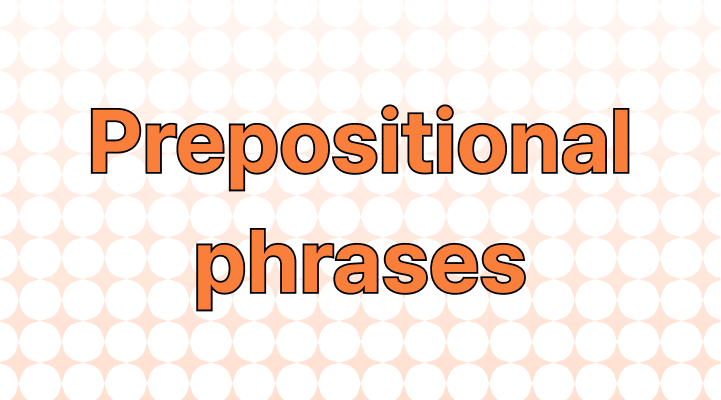A prepositional phrase is a group of words that begins with a preposition ("in," "on," etc.) and typically ends with a noun, pronoun, or gerund. It provides additional information about the relationship between elements in a sentence, such as time, place, direction, or possession.

Prepositional phrases are like the unsung heroes of language, quietly shaping the structure and meaning of sentences without much fanfare. Yet, understanding and mastering these versatile linguistic constructs can unlock a world of expressive possibilities in writing and communication. In this comprehensive guide, we'll delve into the intricacies of prepositional phrases, exploring what they are, how to identify them, common prepositions used, and example sentences to illustrate their usage in various contexts.
What is a Prepositional Phrase?
Let's start with the basics. A prepositional phrase is a group of words that begins with a preposition and ends with its object, which can be a noun, pronoun, or gerund. Prepositions are words that establish relationships between other words in a sentence, indicating location, direction, time, or possession. Examples of common prepositions include "in," "on," "at," "by," "with," "to," and "from."
Prepositional phrase with a noun:
In the park, the children played happily.
Prepositional phrase with a pronoun:
With him, she felt at ease.
Prepositional phrase with a gerund:
She improved her English by practicing speaking daily.
Common Prepositions Used in Phrases
Prepositions come in all shapes and sizes, each serving a unique function in forming prepositional phrases. Some of the most common prepositions used in phrases include:
- in
- on
- at
- by
- with
- to
- from
- under
- over
- between
- among
- beside
- alongside
- through
- within
- around
- above
- below
- across
- against
- toward
How to Identify Prepositional Phrases
Identifying prepositional phrases is relatively straightforward once you understand what to look for. First, locate the preposition in a sentence – it typically precedes its object. Then, examine the words that follow the preposition to determine its object. Together, the preposition and its object form the core of the prepositional phrase, which can provide additional information about the subject or action in the sentence.
Take this sentence for example:
Under the tree, the children found shade from the scorching sun.
In the sentence above, you can identify "under" as the preposition and "the tree" as the noun. Together, they form the prepositional phrase.
Here's another example:
She honed her culinary skills by experimenting with different recipes.
In this example, you can spot "by" as the preposition and "experimenting" as the gerund. Because "experimenting with different recipes" is the whole gerund phrase, the entire prepositional phrase is the sum of the preposition and the gerund phrase: "by experimenting with different recipes."
Examples of Prepositional Phrases in Sentences
To better grasp the concept of prepositional phrases, let's explore some examples:
- The cat on the mat is sleeping peacefully.
- She went to the store with her friend.
- He spends his evenings relaxing by reading novels.
- The book under the table belongs to Sarah.
- For them, the trip was a dream come true.
- We walked through the park.
- He found his keys in the drawer.
- In the garden, the flowers bloom beautifully.
- At the party, laughter filled the air.
- On the table, there was a vase of fresh flowers.
Prepositional Phrases vs. Other Phrase Types
It's important to distinguish prepositional phrases from other types of phrases, such as noun phrases, verb phrases, and adjective phrases. While prepositional phrases begin with prepositions and can function as adjectives or adverbs, other phrase types serve different grammatical purposes. Understanding these distinctions can aid in sentence analysis and comprehension.
In conclusion, prepositional phrases are indispensable tools in the arsenal of any proficient writer or communicator. By mastering the art of identifying and utilizing prepositional phrases, you can enhance the clarity, coherence, and richness of your writing, elevating it to new heights of expressiveness and sophistication. So, the next time you encounter a prepositional phrase, remember to pause, dissect, and appreciate its role in shaping the beauty of language.

Want to sound like a native speaker?
Engram’s AI-powered grammar checker makes your English sound like a native speaker’s, suggesting natural English expressions on top of fixing grammar, spelling, punctuation, word order, and vocabulary.














